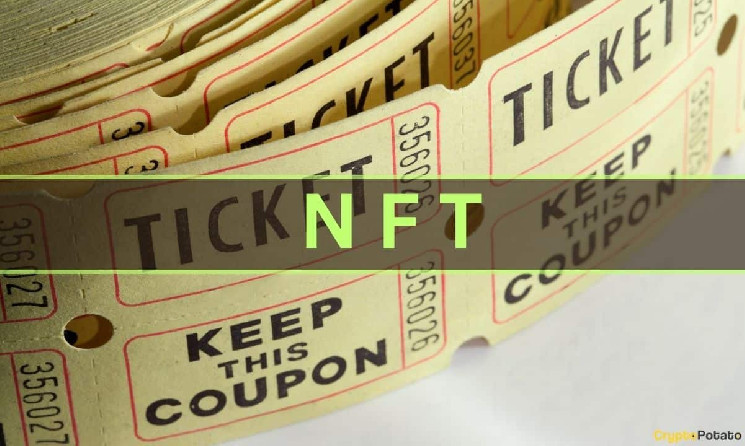Sales of NFT got off to a rocky start in 2023, but the underlying technology still has a lot of utility. Ticketing is an interesting but underdeveloped facet of the NFT space. It stands out as a promising frontier for NFTs in the ever-evolving world of digital advancement.
As a notable application of NFTs, NFT tickets play an important role in declaring ownership and facilitating access to exclusive experiences and events. These digital tickets serve as tangible admission tickets to a wide variety of events, including theme park rides, sporting events and live concerts.
By providing verifiable proof of ownership and authenticity, NFT tickets hold the potential to revolutionize digital authentication and improve the user experience.
NFT Tickets vs. Traditional Tickets
The emergence of NFTs and their applications in ticketing systems has sparked interest and conversation across a variety of industries and stakeholders.
According to former Alibaba executive Toby Rush, both brands and events have incorporated NFTs into their ticketing processes, yielding rewarding results for customers and organizations alike in recent years. The trend is catching fire and captivating a wide range of stakeholders in what is touted as an innovative and mutually beneficial landscape.
While talking to CryptoPotato, Rush said the traditional ticketing industry has been plagued with a variety of problems for decades, from scalpers ripping off honest fans for thousands of dollars for Super Bowl tickets to scammers selling fraudulent tickets at the recent 2023 NBA Finals. Cases of physical card fraud are growing at an alarming rate. Rush believes NFT ticketing can remedy this.
“Since NFTs are demonstrably unique and their veracity can be easily confirmed in the chain, it is simply impossible to counterfeit them in the traditional sense. As for scalping, while profit seekers can sell NFT tickets at high prices in secondary markets, these tokens can also be programmed to pay fees or royalties.
This means that organizers can get at least a share of every secondary sale, unlike traditional ticket sales where scalpers are the only ones who benefit from resale.”
NFT tickets not designed as speculative assets
NFTs are volatile. There is always a possibility that the value of an NFT ticket will drop drastically just before the event. But Rush explains that NFT based tickets are not designed as a speculative asset and are not dictated by the market but by the organizers themselves.
“As such, it is important to distinguish between NFTs as a speculative asset – where an NFT is tied to a speculatively valued work of art, for example – and NFTs used as a digital representation of commodities.
When it comes to ticketing, NFTs can be used as proof of origin for cryptographically verifiable entry into certain events, so they have no inherent value unless they are tied to something of value.
The exec further added that the only way NFT ticket prices can fluctuate independently is in secondary markets, in which case a seller can set a price cap, for example.
This allows the smart contract to prevent that NFT ticket from being resold for a higher amount, discouraging ticket scalping and “ensuring that the most deserving fans have access to affordable tickets, even if they are resold on the secondary market .”
Address bottlenecks and prevent scams
NFT tickets are still an underdog, but have their fair share of bottlenecks that need to be addressed. Limited accessibility is a major barrier to adoption due to their highly technical nature. High gas costs associated with buying and selling are yet another factor. But both problems can be solved on a technical level, Rush said in a statement.
The ex-Alibaba manager added that NFT-based ticket scams are very rare. But one of them is to create eponymous “lookalike” tokens and sell them as the “real thing”.
It’s still quite easy to avoid this type of fraud, Rush added, which can be done simply by verifying who issued the tokens in question. Smaller/suspicious marketplaces should also be avoided as an added security step. He also encouraged individuals to always purchase NFT tickets directly from the issuer.
Rush emphasized the need to be vigilant in their responsibility to enable safe user interactions within this nascent technology. For example, phishing scams have been exemplified in the NFT space. The director added,
“Publishers may advise users never to click on suspicious links, attachments or popups and always verify URL domain names, email addresses and social media handles to ensure authenticity.”
No reason for regulatory threat
The NFT market may have entered summer dormancy, but the post-pandemic shake-up has prompted regulators to point to a range of potential risks that still loom large, including concerns about consumer fraud, money laundering and the evading sanctions.
Rush, who currently serves as CEO and co-founder of Redeem, believes there should be no pushback from regulation.
He explained that since NFT tickets “have no intrinsic value in themselves, but rather serve as proof of ownership for other physical goods, such as access rights, they cannot be considered financial assets, so there is no reason for financial regulators to interfere or push against them.”

